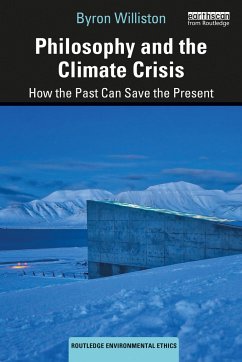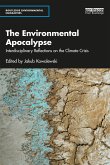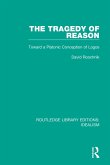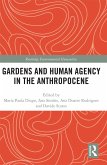This book explores how the history of philosophy can orient us to the new reality brought on by the climate crisis.
If we understand the climate crisis as a deeply existential one, it can help to examine the way past philosophers responded to similar crises in their times. This book explores five past crises, each involving a unique form of collective trauma. These events-war, occupation, exile, scientific revolution and political revolution-inspired the philosophers to remake the whole world in thought, to construct a metaphysics. Williston distills a key intellectual innovation from each metaphysical system:
- That political power must be constrained by knowledge of the climate system (Plato)
- That ethical and political reasoning must be informed by care or love of the ecological whole (Augustine)
- That we must enhance the design of the technosphere (Descartes)
- That we must conceive the Earth as an internally complex system (Spinoza)
- And that we must grant rights to anyone or anything-ultimately the Earth system itself-whose vital interests are threatened by the effects of climate change (Hegel).
Philosophy and the Climate Crisis will be of great interest to students and scholars of climate change, environmental philosophy and ethics and the environmental humanities.
If we understand the climate crisis as a deeply existential one, it can help to examine the way past philosophers responded to similar crises in their times. This book explores five past crises, each involving a unique form of collective trauma. These events-war, occupation, exile, scientific revolution and political revolution-inspired the philosophers to remake the whole world in thought, to construct a metaphysics. Williston distills a key intellectual innovation from each metaphysical system:
- That political power must be constrained by knowledge of the climate system (Plato)
- That ethical and political reasoning must be informed by care or love of the ecological whole (Augustine)
- That we must enhance the design of the technosphere (Descartes)
- That we must conceive the Earth as an internally complex system (Spinoza)
- And that we must grant rights to anyone or anything-ultimately the Earth system itself-whose vital interests are threatened by the effects of climate change (Hegel).
Philosophy and the Climate Crisis will be of great interest to students and scholars of climate change, environmental philosophy and ethics and the environmental humanities.
"Fearing the state of being 'lost in the world we have made,' Williston roams far and wide for reference points in a time of bewildering climatic upheaval. With grand, Harari-like sweeps, this insightful romp through philosophy, literature, ecology, and technology displays the creative boldness the times demand." -- Christopher J. Preston, University of Montana, Missoula. Author of The Synthetic Age: Outdesigning Evolution, Resurrecting Species and Reengineering our World.
"An accessible and engaging analysis of the ways in which the climate crisis is analogous to other, historically significant 'traumas.' This is a vitally important topic, and I applaud Williston for his creative approach to bringing its philosophical aspects to a broad readership." -- Steven Nadler, William H. Hay II Professor of Philosophy, University of Wisconsin-Madison. Author of Think Least of Death: Spinoza on How to Live and How to Die.
"This lucid analysis of the crisis in Western thinking generated by climate change shows how previous historical disruptions have led to the kind of innovations in thought that we now urgently need. It should be read carefully by anyone wondering how to think and act in our new Anthropocene circumstances." -- Simon Dalby, Balsillie School of International Affairs. Author of Anthropocene Geopolitics: Globalization, Security, Sustainability.
"A timely, accessible, smart, and informed discussion of the climate crisis, and our disorienting exit from the Holocene. Williston shows why philosophy matters in these times, how it can be done with passion and rigour, and what wisdom looks like for all of us worried about the future of life." -- Todd Dufresne, Lakehead University. Author of The Democracy of Suffering: Life on the Edge of Catastrophe, Philosophy in the Anthropocene.
"An accessible and engaging analysis of the ways in which the climate crisis is analogous to other, historically significant 'traumas.' This is a vitally important topic, and I applaud Williston for his creative approach to bringing its philosophical aspects to a broad readership." -- Steven Nadler, William H. Hay II Professor of Philosophy, University of Wisconsin-Madison. Author of Think Least of Death: Spinoza on How to Live and How to Die.
"This lucid analysis of the crisis in Western thinking generated by climate change shows how previous historical disruptions have led to the kind of innovations in thought that we now urgently need. It should be read carefully by anyone wondering how to think and act in our new Anthropocene circumstances." -- Simon Dalby, Balsillie School of International Affairs. Author of Anthropocene Geopolitics: Globalization, Security, Sustainability.
"A timely, accessible, smart, and informed discussion of the climate crisis, and our disorienting exit from the Holocene. Williston shows why philosophy matters in these times, how it can be done with passion and rigour, and what wisdom looks like for all of us worried about the future of life." -- Todd Dufresne, Lakehead University. Author of The Democracy of Suffering: Life on the Edge of Catastrophe, Philosophy in the Anthropocene.









